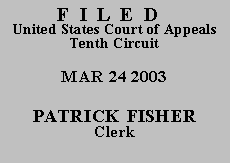

|
UNITED STATES OF AMERICA, |
|
Before SEYMOUR, MURPHY, and O'BRIEN, Circuit Judges.
Defendant William Rena Johnson ("Johnson") was charged with knowingly making a false statement or representation on a federal firearms form in violation of 18 U.S.C. § 924(a)(1)(A). After a two-day jury trial, Johnson was convicted. Johnson appeals his conviction arguing that there was insufficient evidence to support the jury's verdict.
I. Background
On December 12, 1995, Johnson was convicted of two felony offenses in Cook County, Illinois for which he served over one year of imprisonment. On March 4, 2000, Johnson attempted to purchase a handgun at Superpawn in Oklahoma City, Oklahoma. Jimmy Gutierrez ("Gutierrez"), an employee of Superpawn, told Johnson that he needed to provide a form of identification and complete an Alcohol, Tobacco, and Firearms ("ATF") Form 4473 prior to obtaining a handgun. Gutierrez provided Johnson with a 4473 form. Question 9c on the 4473 form asks the following: "Have you been convicted in any court of a crime for which the judge could have imprisoned you for more than one year, even if the judge actually gave you a shorter sentence?" Johnson answered "no" to this question. Johnson then signed the 4473 form to certify that his answers were true and that he understood that making a false statement on the form was a felony.
After Johnson completed the 4473 form, Gutierrez called the National Instant Check System ("NICS") so that a background check could be performed on Johnson. The NICS indicated that the background check was "delayed." Gutierrez informed Johnson of the delay. Johnson returned to Superpawn a few days later. Gutierrez informed Johnson that the NICS denied his 4473 form. Johnson then asked Gutierrez whether Gutierrez could personally sell him a gun. Gutierrez told Johnson that he would not sell him a gun. In response, Johnson told Gutierrez that he needed a gun and he would find one elsewhere.
After the denial by the NICS, an ATF agent obtained the 4473 form Johnson completed at Superpawn and discovered that Johnson had indicated that he had never been convicted of a crime for which he could have been imprisoned for more than one year. The ATF agent questioned Johnson regarding his response on the 4473 form. Johnson told the ATF agent that he thought after seven to ten years his convictions would no longer be reflected on his record.
II. Discussion
In evaluating a sufficiency of the evidence claim, this court will reverse the jury's verdict "only if no rational trier of fact could have found the essential elements of the crime beyond a reasonable doubt." United States v. Haslip, 160 F.3d 649, 652 (10th Cir. 1998) (quotations and citation omitted). This court reviews the record de novo, viewing the evidence and any reasonable inferences drawn therefrom in the light most favorable to the government. Id. at 652-53. This court, however, will "neither weigh conflicting evidence nor consider the credibility of witnesses." Id. (quotations and citation omitted). Further, questions of statutory interpretation are reviewed de novo. United States v. Acosta-Olivas, 71 F.3d 375, 377 (10th Cir. 1995).
Pursuant to 18 U.S.C. § 924(a)(1)(A), it is unlawful for a person to "knowingly make[] any false statement or representation with respect to the information required . . . in applying for any license . . . under the provisions of this chapter." 18 U.S.C. § 924(a)(1)(A). Johnson argues that to uphold his conviction under § 924(a)(1)(A), there must be sufficient proof that Johnson knowingly provided false information on the 4473 form with the intent to deceive. To support his argument, Johnson cites United States v. Hernandez, 913 F.2d 1506 (10th Cir. 1990). In Hernandez, this court examined 18 U.S.C. § 922(a)(6), which prohibits "any person in connection with the acquisition or attempted acquisition of any firearm . . . from a licensed . . . dealer . . . knowingly to make any false or fictitious oral or written statement . . . intended or likely to deceive such . . . dealer . . . ." Hernandez, 913 F.2d at 1513 (quoting 18 U.S.C. § 922(a)(6)). Unlike the provision at issue in Hernandez, however, the government need only prove that the defendant knowingly provided false information on the 4473 form to convict the defendant under § 924(a)(1)(A). See Bryan v. United States, 524 U.S. 184, 188 (1998) (noting that the intent required under § 924(a)(1)(A) is "knowingly").
The government presented evidence that Johnson answered "no" to question 9c on the 4473 form. Further, the government presented evidence that Johnson had been convicted in 1995 of two felonies for which he served over one year of imprisonment. The government also presented evidence that Johnson informed the ATF agent who questioned him regarding the 4473 form that he believed his two felony convictions would not be reflected on his criminal record after seven to ten years. Johnson, however, had been convicted of two felonies only five years prior to his completion of the 4473 form. Finally, the government presented evidence that after his 4473 form for the handgun had been denied, Johnson asked Gutierrez if he would personally sell him a handgun. Viewing this evidence in the light most favorable to the government, we conclude that a reasonable jury could conclude beyond a reasonable doubt that Johnson knowingly made a false statement in connection with his application for a license in violation of 18 U.S.C. § 924(a)(1)(A).
For the reasons stated above, this court affirms Johnson's conviction.(2)
ENTERED FOR THE COURT
Michael R. Murphy
Circuit Judge
*. This order and judgment is not binding precedent, except under the doctrines of law of the case, res judicata and collateral estoppel. The court generally disfavors the citation of orders and judgments; nevertheless, an order and judgment may be cited under the terms and conditions of 10th Cir. R. 36.3.
2. Appellee's motion to supplement the record on appeal with exhibits admitted at trial but not included in the district court's record is granted.